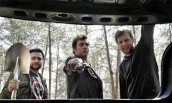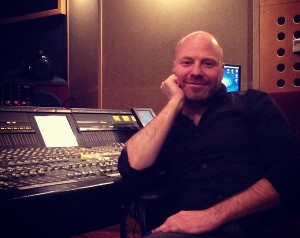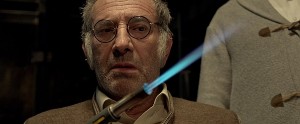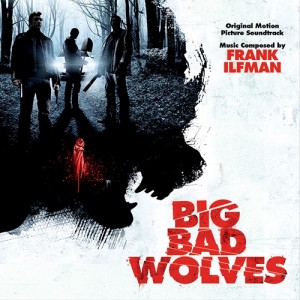One could say that the world first became aware of the Israeli film BIG BAD WOLVES (now out on DVD and Blu-ray) through Quentin Tarantino’s raving. And it’s easy to see why when you’ve got the setup of some poor shmuck chained to a chair, his unhinged tormentor delivering a humorously sadistic monologue before unleashing the bloody pain. But beyond the kind of unbearable shenanigans that might have the morally outraged screaming “torture porn!” lies a wonderfully twisted, and appallingly funny thriller that’s far more Hitchcock than Tarantino as a seeming child killer is given his just deserts – delivered courtesy of a victim’s father and a police detective whose taste for old school interrogation techniques is matched in a way he never expected.
Written and directed by Aharon Keshales and Navot Papushado (whose acclaimed “Rabies” put Israel on the horror movie map), BIG BAD WOLVES‘ cunning plot and ghastly reversals of fortune that The Master of Suspense would no doubt have appreciated is given a brilliantly Herrmann-esque score by Israeli-born composer Frank Ilfman. He’s seemingly learned much from an American musician whose memorable themes were jollily macabre accomplices at turning shower slashings, strangulations and assassination into works of cinematic art that shamed our moral sensibilities as much as they delighted our inner sadists, Ilfman has a similarly devilishly sense of melody in unleashing the pain and payback. Continuously driven by a truly great main theme, Ilfman walks the musical razor’s edge between humor and horror. Conveying the fable like idea of an eater of innocence through child-like bells, Ilfman’s rhythmically brings on the Gothic violins and doom-ridden orchestra, with a military march that unearths WOLVES whole other level of conveying a country where savagery is the ho-hum norm on all sides. It’s a pluckily stormy attitude at once breezy and awful, not afraid to break from black humor to reflect an outright comedy of torture errors, or the truly awful deeds of a seeming murderer that would incur such biblical wrath – and lower his tormentors to that level. But unlike the dissonance of many American scores when approach similar subjects, the one sin that Ilfman is happily free from here is lacking in harmony. For whether brooding or bouncy, BIG BAD WOLVES proves itself as one of the most tastefully thematic “horror” scores in many a moon.
Having now won a special mention for his BIG BAD WOLVES score at the genre-themed Sitges Film Festival, and the scoring Oscar equivalent in his native Israel, Ilfman (whose many English language works include LOCKED IN, MERCENARIES and MAY I KILL U?) reflects on a score of accomplished nastiness that just might have Hollywood gnashing at his throat when America encounters a movie that takes a country’s cinema not exactly known for its thrills to a new high point in brilliantly staged, and played darkness.
ASSIGNMENT X: Would you consider yourself a musical Israeli expatriate?
FRANK ILMAN: I would say yes, I was born in Israel and my parents loved music of all sorts, so there was always music playing in the house, then when I was ten, I went on to study trombone and piano at the Jaffa Conservatorium where I did all my musical studies.
AX: One senses you’re a student of Bernard Herrmann in just how darkly thematic and orchestral your score is. What was it about his suspense music that appealed to you, and were you going for a Hitchcockian vibe here?
ILFMAN: Thank you, that’s a great compliment, I am a big admire of Bernard Hermann works both on screen and off, one of the great things about Hermann’s work beside his writing, it is he mastery of the orchestra and combining different instruments to create certain moods that reflect the inner feeling of the characters. Something I always try and do in all my work. Actually I am a big fan of the Hollywood golden age like Copland, Korngold, Steiner, Raksin, to name a few, they all wrote such bold and striking music, so I am a big believer in using an real orchestra when ever possible in what ever combination.
So when it came down to scoring BIG BAD WOLVES straight from the start both the directors and myself knew that it will be a proper bold orchestral score performed with a live orchestra. They actually didn’t temp the movie with Hermann’s music at all, maybe one cue I think there was in one of the basement scene, which, believe it or not, it was actually temped with Hans Zimmer. There was also some of Michael Kamen’s DIE HARD score that got used. So we weren’t really going for a Hitchcockian score, I think it’s the case where the music is very dark and bold, despite the fact that most of the movie takes place in one room. It’s almost like another character in the movie.
AX: Were there any kind of similarly macabre, pitch-black humored films, or scores that gave you further inspiration?
ILFMAN: I would say some of Carter Burwell’s music for the Cohen Brothers movies inspired me. The Cohen’s films are always great and full of black humor. The way that Tarantino uses his music in some scenes was also discussed before I started working on BIG BAD WOLVES.
AX: From watching the filmmakers’ last film RABIES did you know what you were in for?
ILFMAN: Ah hell NO!! RABIES was a rescue job for me and we didn’t had much time to mess around with the music, on “Wolves,” I was brought very early on, actually while the movie was in early stages of the edit. Then it was recut again, so much of the music that was already written was left out because it didn’t fit with the new cut and approach. Aharon and Navot do like to push you to the edge sometimes, but in a good way.
AX: There’s a sense of pounding relentlessness to the score. How did you want to play, and differentiate all of the suspenseful set pieces in the film, while showing how the plot was inexorably advancing?
ILFMAN: I think one of the key elements in any kind of horror or a thriller type movie that involves some dark and psychological elements is that there is always the feeling that things are going to get worse and worse by the minute. If you just hit the audience time after time with the music just pounding away, they lose interest, as it’s all very predictable. Since in WOLVES you don’t really get to see much of the horror on screen, my approach was to build the music in places where it brings you to the edge, then drops completely into silence, leaving it to the sound to take over, or to use some atonal sound and let the audience imagination the rest. It’s a very devilish approach but it works wonders!
AX: How did you devise such a powerful theme that’s as much of an accomplice as the characters?
ILFMAN: The movie starts with a complete silence, slow motion visuals that go on for five minutes. So I wanted to compose a theme that will be memorable and bigger then life reflecting the full movie in one piece, something in the vain of THE GODFATHER, as it needed to support the images on its own for the opening credits and let the audience know they are into a crazy ride.
AX: The theme all uses bells in a fairy tale way that reflects the idea of getting snatched by “Big Bad Wolf”
ILFMAN: It’s true, we wanted a dark fairy tale feel. Like “Once Upon A Time,” a bigger then life story is being unfolded before us.
AX: How did you want to keep the balance between horror and humor
ILFMAN: I wanted to keep them almost separated, to play the humor in the music in the scene and let it lead when there are comical moments. This actually gave a rest to the audience to get their guard down before we hit them again with a horrific moment.
AX: How important was it for you write cues that would be out-and-out suspenseful, or horrific?
ILFMAN: It was on some cues. You have scenes where the father’s mind goes on full about describing what he is about to do, just to be snapped out by a comical remark or a sound. The goes into some of the horror moments in the movie.
AX: There’s quite a bit of escalating family madness in the movie. Did you view yourself as scoring a psycho thriller as well
ILFMAN: Some parts of BIG BAD WOLVES are very psychological with the characters’ state of mind and what actually is going on under their surface. For those scenes the approach was like scoring a thriller.
AX: What do you think of the movie’s broader themes of police brutality, innocence and the need to go to any length for a confession?
ILFMAN: Well, it’s a tough one. This can be applied to the army’s use of torture to obtain information that can save lives. I’ve been in the military forces, so I can see the use and necessity of it. But as a human being I don’t support brutality in any way from the police or the army.
AX: If you have kids, did it make you relate to the characters’ “just” cause? And how did you want to reflect that in the score?
ILFMAN: I think any father would feel like that. We all want to protect our family and feel we are there for them, But then there is the sense of guilt that we didn’t do or were there to prevent it. So when I write for a character driven movie, I always try and put my self in their place. How would they feel? How would they act? Then I channel those into the score. It’s probably like method acting in a way.
AX: How did you want to play the passive, nebbishy character of Dror, whom everyone thinks is a child killer? And how did you want to differentiate between his interrogators?
ILFMAN: Dror was a hard one, as we didn’t want to tell the audience what he is or not. We wanted people to keep on guessing till the end, so I wanted to have some variability in the music for his character. The same goes for the rest of the cast, the police man had some humor in his music, the father a touch of dissonant and sadness, to give that sense of madness and revenge building. His father had a very bigger then life march, so those musical elements gave the audience a subtle feel to who the characters were.
AX: One of the more powerful montages uses a militaristic approach as the “plan” gets set into motion. How did you hit on this idea?
ILFMAN: Heavy Metal music!! The director at some point replaced my music cue with some heavy metal rock song that had some march drumming at one point of the song. When I heard it, I could visualize the music as MISSION: IMPOSSIBLE! It’s all a “go” type feel to make it bigger and bigger with the instrumentation and the march drumming as we progress into the montage and to the climax of the scene.
AX: You’ve gotten a particularly full sound from the London Metropolitan Orchestra for your score. What were your tricks for achieving its diabolical lushness?
ILFMAN: Its all in the layering and details!! For me music is like colors and I love to layer electronics, instruments and just experiment. We recorded a large chamber ensemble of violins, cellos and basses, where we would have the bass section in the middle, violins to the left, cellos to the right. We divided the cellos into two sections A and B, so section B would actually play the violas parts when needed and by doing that we would get a more solid rounded sound to the score. The winds and brass were then re played trough our ’3 speaker system’ via the hall we arranged, and was then recorded again for the surround and effects with different positioning. For all the percussion we used on the more bombastic cues, we used the same approach by re-sampling them again via the hall and our ’3 speakers system’, so we had a very natural sound of the space, yet more controlled for when we wanted to use the close mike for some cues while keeping some of the space with different areas to align any instrument with full controller. For the electronics my team and I created all these metallic rusty sounds from an old saw or a violins bow played on an old bike wheels and then we sampled and manipulated them, so they could be played at any register. There were also some old analog Moog basses to play undertones with the orchestra.
AX: What kind of instrumentation works best for you in conveying pitch-black humor?
ILFMAN: I used contra bassoon and bass clarinets for the comical moments. They can be very dark instruments, but also extremely clumsy in feel and how they’re played, I also used the full string section to play pizzicato. And as a one note-plucking instrument, giving it a sense of comedy in some dark moments with the woodwinds playing the main melody.
AX: Do you think the kind of melody you use in BIG BAD WOLVES is something that the thriller genre could use more of in America?
ILFMAN: I think any movie that is a character driven should have a main theme or two. It helps the audience to connect better to the movie and its subject.
AX: Were you able to watch films with extended torture sequences in them before BIG BAD WOLVES came your way? And were there points of the film that you found difficult to score, let alone watch?
ILFMAN: Yes, I have enough life experience with dark subjects, so it’s hard to shock me. Some documentaries I’ve worked on were much more harsh to do then any horror or thriller movies I worked on.
AX: Do you think your score in turn makes it easier to watch the ghastlier scenes in BIG BAD WOLVES?
ILFMAN: I tried. I have seen people in the audience covering their eyes in some scenes, but on some they didn’t, as the music was comforting. That made them stay tuned while watching horrific stuff.
AX: There’s a running joke of the torture being interrupted by one thing or another. How did you want to capture the escalation to the “button” of the interruption, or play the characters’ dismayed reactions?
ILFMAN: There are many edgy rises during the torture scenes, I played Dror’s state of mind as he was about to be tortured or suffer. His mind is going crazy at this point. There is such stress and panic building inside him, and then it’s a drop. There is hope it may not happened, and that he’ll be saved, so I brought the music to a very high point where the orchestra would play very brush and cold and then to a full stop. So it gives a great sense of release when the music stops playing.
AX: There are a number of monologues that mix crafty, sadistic dialogue with violence. How important was it for you to play off the horrific descriptions, as well as to capture the head games that are going on?
ILFMAN: Most of it was to play the psychological elements, to play tricks on the audience with how to make them think in a different direction, yet planting the seed that something bad is going to happen, and build it up like Legos, so by the time it happens, the audience has already been stretched to the limit just by the monologue and music.
AX: With a lot of the film set in a cellar, how important was it for your music to “open up” the action?
ILFMAN: I wanted the sense of claustrophobia in the cellar to make the audience feel as they are in a very confined space, with no room to escape or breath. Once we were on the outside of it, the music is mostly all action. So there was more room for the orchestra to play and be lush and loud.
AX: If you got a similar Hollywood film to BIG BAD WOLVES, would you approach it in the same way? And if not, what do you think you’d have to do differently?
ILFMAN: A lot of it depends of the movie. I believe that every movie has its own personality so my orchestration for approaching the score would be different. But as to my own style or writing and voice, the music would be the same.
AX: In that respect, do you think there’s anything necessarily “Israeli” about BIG BAD WOLVES?
ILFMAN: I am a German Israeli born. I grew up in Israel and have been working on Israeli movies since the early 90’s, from my base studio in London. I do find Israelis films to be of a small scale both in sound and music. Much of that has to do with how the directors and editors approach the music aspect. There is always a sense of scare that the music is too big and will take over. I mean very few movies are done there using any type of orchestra? With WOLVES, the ‘Israeliness’ of it is in some the characters’ stereotype within the Israeli society, and the language they use. Besides that, it’s a very Hollywood type movie.
AX: In your way, do you hope your music is helping get across the message that a cinema that isn’t known for being particularly entertaining and international in appeal is capable of it?
ILFMAN: Yes to a degree. Again, it depends on the movie of course. But as a filmmaker you want the audience to enjoy and be entertained while watching the movie. So when you have a great combination of a script, performances, sound and music put together, it’s a win-win and that was the approach when we did BIG BAD WOLVES.
AX: What can we expect from you next?
ILFMAN: Now that we have a CD, we are gearing up for the album release of BIG BAD WOLVES on vinyl! I am now just finishing my score for the ABC’S OF DEATH with Aharon and Navot. Then we then start on the next feature from the guys called ONCE UPON A TIME IN PALESTINE with a bigger orchestra then we had for WOLVES, have two more features coming up later in the year that I can’t talk about yet, a new television series with supernatural elements and another soundtrack album release of a score I recorded in Germany a while back for a movie called KILLING GIRLS, a very melancholic and haunting score. These are exciting times indeed!
Buy the BIG BAD WOLVES score available on Movie Score Media HERE
Visit Frank Ilfman’s website HERE
AGREE? DISAGREE? LET YOUR VOICE BE HEARD – COMMENT BELOW!
Follow us on Twitter at ASSIGNMENT X
Fan us on Facebook at ASSIGNMENT X
Article Source: Assignment X
Article: Interview with BIG BAD WOLVES composer Frank Ilman
Related Posts:














